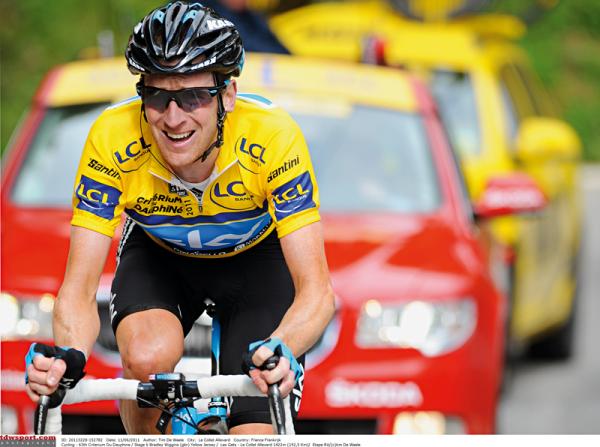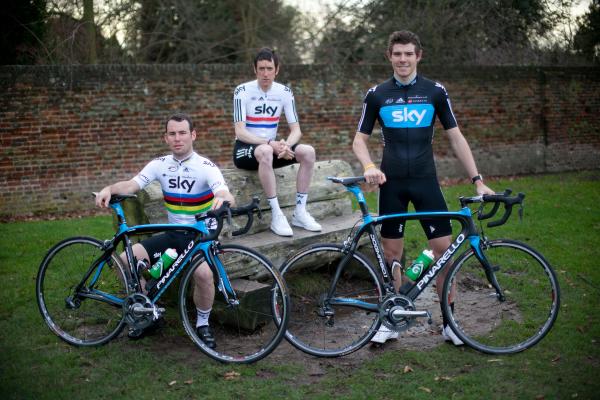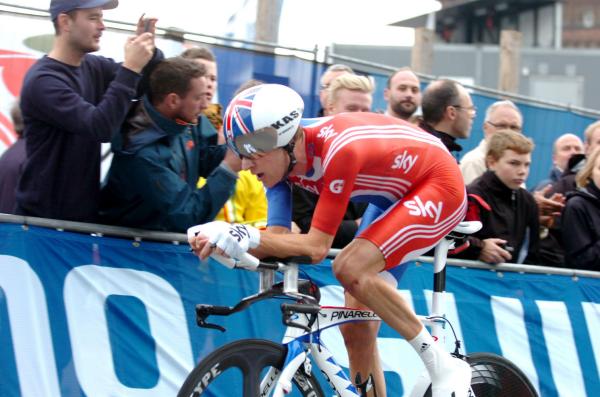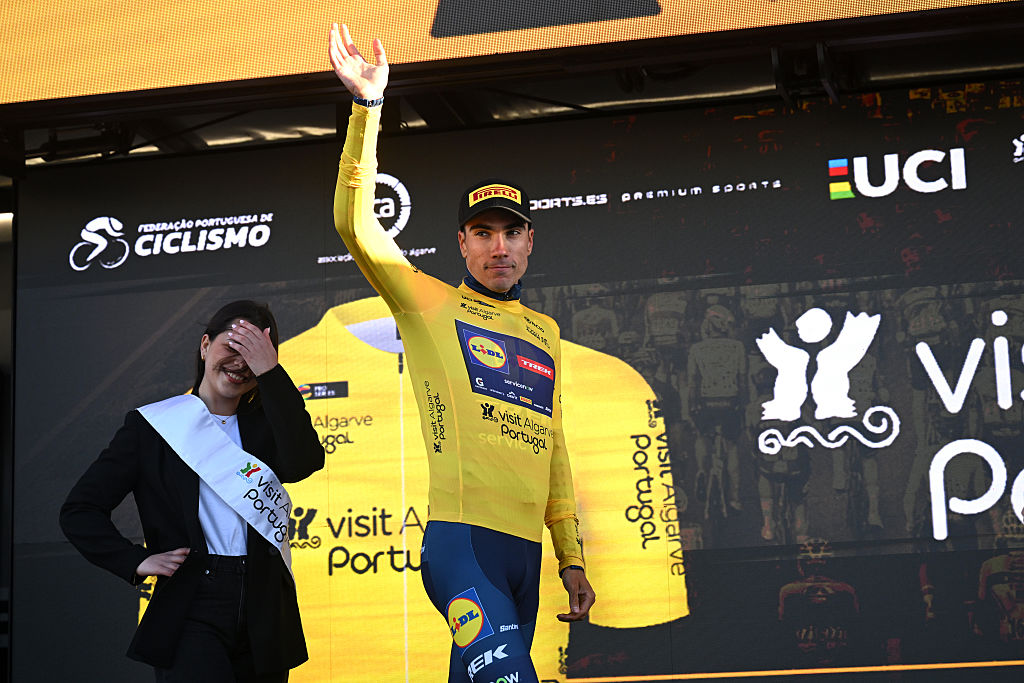Cyclingnews exclusive: Bradley Wiggins interview
British rider talks about fame, the media and why he's in the best shape of his career
The latest race content, interviews, features, reviews and expert buying guides, direct to your inbox!
You are now subscribed
Your newsletter sign-up was successful



As he admits himself, Bradley Wiggins has cut a more relaxed and reflective figure in the last year or so. Experience, maturity and a good run of results in 2011 - Tour de France aside - have lifted the storm clouds that at times followed him around since he finished fourth overall in the 2009 Tour de France.
Finding a "home" at Team Sky, a place that he says he never wants to trade for anywhere else, seems to have given him the ideal platform from which to fulfill his lofty ambitions of Grand Tour success, and the difference that this has made to Wiggins is noticeable. Cyclingnews was given access to Team Sky's pre-season training camp in Majorca last week and managed to catch up with Wiggins for a chat about the past, the present and the future...
Cyclingnews: You've been a professional for more than ten years now. That's an achievement in itself. If we were able to show a 21-year-old Bradley Wiggins a list of your successes up to now, how do you think he would react?
Bradley Wiggins: With quite a lot of relief I imagine, because I kind of expected to do all of that when I was a kid or at the very least thought that I was capable of it. My achievements aren’t complete yet but 10 years on we’re slowly getting to the places where we should be going. I’m not really one for dwelling on things too much but when I was that age I did imagine myself winning things like the Dauphine and riding in the Tour de France and maybe winning some stages and doing well in the race. Back then though I don’t know if I ever really thought that I could win the Tour. It was such a big deal when I was young, watching Lance and those guys in action. But the sport’s changed a lot. Ten years ago I’d already been to the Olympics and so the Olympics were already a huge part of my life. After tasting it in Sydney in 2000 I just wanted more of it and it was everything to me back then.
CN: Cycling has given you so much. But do you ever dwell on the things that it has taken away from you? Such as the disruption of family life, all the travelling and all the hours spent training?
BW: Sometimes I do think about that, yes. I have definite times when I do wish that I was at home more with my wife and my children. But other times you think that you’ve got the best job in the world. It beats the nine-to-five, that’s for sure. I’ve never regretted anything else about it, other than missing out on time with my family. I certainly don’t regret missing out on my teenage years or anything like that. Cycling has given me everything. It’s given me rewards and privileges and it was the life that I always wanted.
CN: So if your kids came up to you in a few years and said "dad, I want to be a professional rider", what advice would you give them? And is it a life that you would want for them?
The latest race content, interviews, features, reviews and expert buying guides, direct to your inbox!
BW: If they wanted to do it then I would support them. If I’m honest I’d rather they didn’t though, I’d prefer them to do another sport but my son loves cycling and he raced last year so you never know. In terms of advice, “don’t do drugs” would be a good one.
CN: What about your relationship with the media? Do you treat the cycling press and the national newspapers and TV stations any differently? Do you find that they treat you any differently?
BW: Well I’ve had my moments with the cycling press. Not so much with the newspapers. There’s so much of it now - because cycling’s got so popular, there’s so many websites and forums out there. I suppose they do treat us differently. A lot of the cycling press seem to call us ‘Wiggo’ and ‘Cav’, which is really quite informal. I had a rocky period with the cycling press a couple of years ago - I had my own issues back then, which they didn’t help with. We’ve kind of put that behind us now and have formed a better working relationship. Cycling has gone through so many changes, especially in Britain, that there are so many more people trying to benefit from it now. That’s bound to cause some fallout.
CN: How do you handle fame? Is it something you enjoy or would you prefer more anonymity?
BW: I don’t see myself as being famous really. I think you get recognised, and there’s a difference between that and fame. It’s recognition for achieving something, which is fantastic as I think it’s all that anyone really wants in their life – recognition for doing well at whatever they do. People do come up to me when I’m out and say “well done in this race” or “unlucky in that race” and it’s really nice that people are affected so much by it that they do things like that. Plus we don’t have tribalism like we do in soccer, so you don’t get rival supporters screaming abuse at you in the street or anything. It’s nice that cycling is a ‘loved’ sport I suppose, that so many people take enjoyment from it and that you get to play a part in that. It’s slightly weird as you never really see yourself as anything other than the person you’ve always known. As a kid you watch the Tour and the big races. I grew up a massive fan of the sport so to be in this position still feels slightly odd at times. It makes you appreciate what you’re doing. Not so much in terms of responsibility, more in the sense that you appreciate the life that you have and that you can’t take it for granted. There are millions of people out there who would love to be in my position. Success and recognition has helped me enjoy the sport more I suppose. I wasn’t really doing that in 2010 but I’ve learned to love it now and that’s reflected in the results I’ve been getting. It comes with age and experience, as you accept and adopt the lifestyle more easily.
CN: How are things going here at the camp in Majorca? What kind of shape are you in?
BW: For me now it’s just a 12-month cycle. It’s not just a three-month blowout in the season and then back again next year. The minute the season stops I’m looking ahead to the next one and making sure I keep in shape. These camps have helped a lot. Now you turn up in December and guys are arriving fitter and fitter every year. The days have gone now where people just start training on January 1 after a long break. This team is going from strength to strength in that sense and everyone is pushing each other constantly. It’s quite impressive to see. This year I’d say I’ve had the best winter I’ve ever had. I did the Vuelta towards the end of last season and it’s really carried me through. I moved up a level last year and I’m just hoping to continue that. The signs have been really good so far here at the camp so I’m in a great place at the moment even compared to last year. It’s been so well organised here. It’s familiar after our stint here in December and it’s a really easy place to get work done.
CN: Looking backwards again, if you could single out a couple of major influences on your career who would you choose and why?
There’s so many really. When I was a junior, Sean Bannister, who was in west London, took me on and got me to that next level as a junior. That was the first time I’d had any proper training. As I kid you don’t train, you just get on your bike and ride it. After that, when I was in my early 20s, Chris Boardman really got me thinking about what I was doing in terms of the organising of your training and your life, which is so important. He took me to world and Olympic glory really. Then later on Shane Sutton would be a big influence. But away from all that there’s my wife. In the last ten years she has had to deal with successful Brad, unsuccessful Brad, moody Brad and depressed Brad. She’s been there for me throughout it all and we have grown together up to this point. But so many people have an impact on you that it’s hard to choose.
CN: You have plenty of experience and have lived through some big changes in the sport. Using that experience, if you could change one thing about the way the sport is run what would you choose?
BW: It’s a difficult question because it’s not something I really think about too much. I’m very selfish in that sense. I tend to just concentrate on what I’m doing and what I need to do. I’ve given up worrying really. There’s a lot that could change or be better, there isn’t one specific thing. We have guys like Bernie [Eisel] who go and talk to the UCI about any issues as our representatives. So I don’t really care about any of that. As long as I am paid and I can train I’m happy enough.
CN: Asking you to look forward a bit now, do you think you will retire at Team Sky? Can you see yourself ever riding for another team? And have you had any thoughts as to what you might do when you eventually hang up your cycling shoes?
BW: I’d love to stay here for the rest of my career now. It feels like home, it’s where I want to stay and I can’t imagine ever riding for anyone else. In terms of the future, it’s hard. I’d quite like to be a personal trainer of some description – maybe a fitness trainer for a rugby league team, which is a sport I like. But it’s hard to say as I’m so focussed on what I need to do here over the next couple of years or so. After that, I don’t think you really know until you stop; opportunities come along and you have to work out if you want to take them or not. But I do feel that maybe I have something to give back, in terms of sport, at some level. I guess that’s for other people to decide at some point further down the line. We don’t like thinking about retirement too much. I’m 32 this year, so I’ve hopefully got at least another five years in me, maybe more. We’ll see…
Mark joined the Cyclingnews team in October 2011 and has a strong background in journalism across numerous sports. His interest in cycling dates back to Greg LeMond's victories in the 1989 and 1990 Tours, and he has a self-confessed obsession with the career and life of Fausto Coppi.
